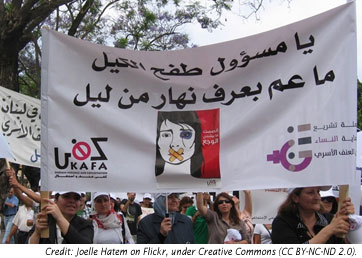
 BEIRUT, Lebanon (WOMENSENEWS)–If street fashion is considered a gauge, Lebanon might be mistaken for an oasis of emancipation for Arab women.
BEIRUT, Lebanon (WOMENSENEWS)–If street fashion is considered a gauge, Lebanon might be mistaken for an oasis of emancipation for Arab women.
Given the dominant stereotypes that prevail in most Western countries towards Arab societies, people are often surprised to see that the dress code in Beirut is diverse and that women cover up in various ways.
Dress code, however, is not the same as legal rights.
Here in the Land of Cedar, no law criminalizes violence against women; our constitution is widely interpreted as sanctifying domestic privacy. All this means no real possibility exists in Lebanon to intervene to protect a woman in her home, which is where women the world over are most at risk of violence.
The Lebanese women’s movement is working to change this.
A bill that proposes criminalizing physical, mental and sexual abuse of women, along with marital rape, recently came up for discussion in Parliament, which created an outcry from state religious leaders who prevented the bill’s passage. These opponents assailed the bill as an attempt to "destroy" the Lebanese social fabric, an attack on the family unit that minimized the authority of a father.
Religious authorities resorted to the much-used argument of calling the bill an imposition of the West, even though it’s been supported for years by a Lebanese coalition of 41 legal and women’s rights groups.
Not only does the criminal code not protect women from violence, articles 507 and 508 do not consider marital rape as a crime. In fact, Article 522 stipulates that the state will not prosecute a rapist and will nullify his conviction if the rapist marries his victim.
An article that allows for lenient treatment of perpetrators of so-called honor crimes–where women are slain by family members to protect or clear a family’s honor–was only recently erased from the criminal code.
Resisting Pressure
 The Lebanese women’s movement has been resisting pressure to stop advocating for and claiming our rights, and we have gotten better organized.
The Lebanese women’s movement has been resisting pressure to stop advocating for and claiming our rights, and we have gotten better organized.
KAFA, a Lebanese association for women’s rights based in Beirut, just launched a campaign during the 16 Days of Activism Against Gender Violence (Nov. 25 through Dec. 10) to criminalize marital rape.
The campaign was coupled with an evening organized by the Lebanese feminist collective Nasawiya to raise awareness. That event coincided with the third annual One Day One Struggle, a day dedicated to highlighting sexuality issues in what organizers describe as Muslim societies.
That night, an untitled play performed by the theater band Live Lactic Culture dramatized the daily life of a married couple in Lebanon. Domestic bliss at the beginning of the marriage deteriorated over the course of performance as the husband became increasingly violent and authoritarian. In one scene toward the end, the husband ordered his wife to go wait for him on their bed. The play ends with a woman stranded in a marriage that has descended into verbal, physical and sexual violence.
The play succeeded in showing the gradual way a relationship can degrade. People often wonder how and why women stay in abusive relationships. This play dramatizes how it doesn’t necessarily happen brutally or overnight. Sometimes it escalates slowly. A rude comment here, a push there can slowly eat away at a woman’s self-confidence, all the more if she knows there are no legal protections available to her.
Audience Open Mic
The play was performed on a night when the microphone was open to audience members, who came on stage to role-play and discuss what they thought the woman should do, or how they thought the situation could be solved. This spurred more reactions and debate. The audience was mostly young and included men and women who expressed a diversity of views.
Some participants felt strongly about the need for the woman to resist.
Others raised the problems in doing that: the woman’s financial dependence, her lack of supportive family members to help her out, a void of legal and public protections. Standing up for herself, some audience members said, could mean risking her life.
The evening also provided an airing of common Lebanese questions about marital rape. Shouldn’t women be careful about who they marry in the first place? Isn’t having sex a wifely duty after all?
Two members of the collective Nasawiya engaged in the question and answer sessions, giving relevant, well documented and precise answers. Often they responded to patriarchical attitudes by drawing from the human-rights premise that women are humans who deserve to be treated as men’s equal in accordance with many international treaties and covenants.
To the idea that sexual relations are a wifely duty that women must bear, for instance, they emphasized that women had a right to a private life, to live free from violence and that the integrity of their bodies should be respected,
This is the kind of public discussion we need at this point; to build public understanding of why and how Lebanon’s criminal code must be changed.
Would you like to Comment but not sure how? Visit our help page at https://womensenews.org/help-making-comments-womens-enews-stories.
Would you like to Send Along a Link of This Story?
https://womensenews.org/story/rape/111208/in-lebanon-violence-between-the-sheets-legal
Paola Salwan Daher is a women’s rights and BDS (boycott, divest, sanction) activist, a blogger and a writer currently living in Beirut, Lebanon. She’s a member of the feminist collective Nasawiya. You can read her two blogs at www.cafethawra.blogspot.com and www.myrrhandmint.tumblr.com


